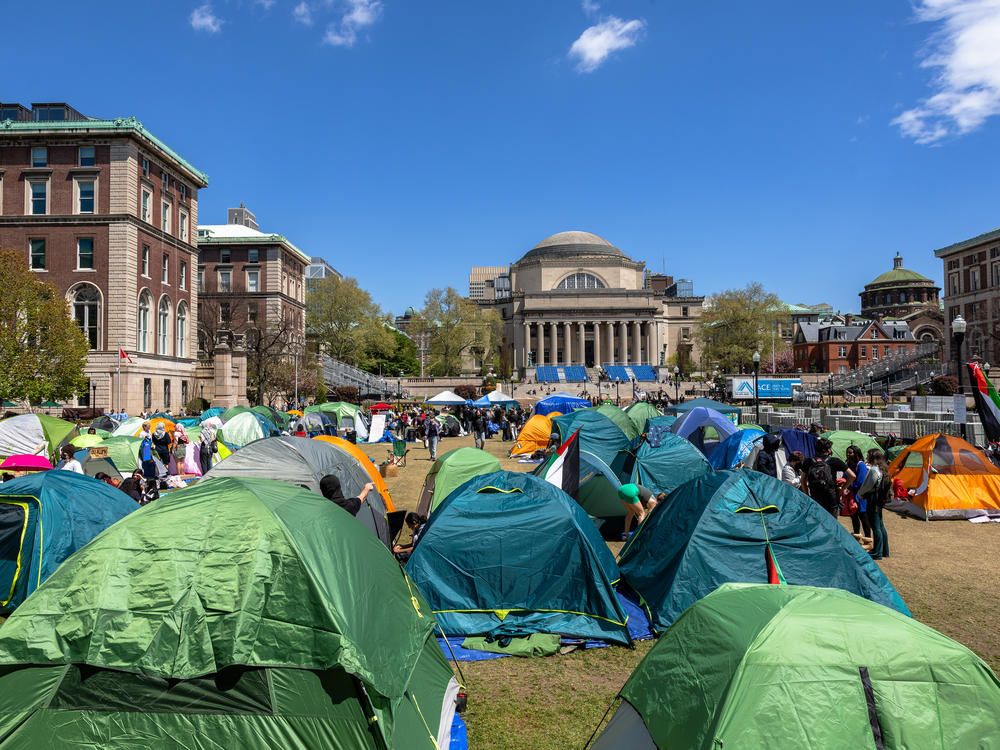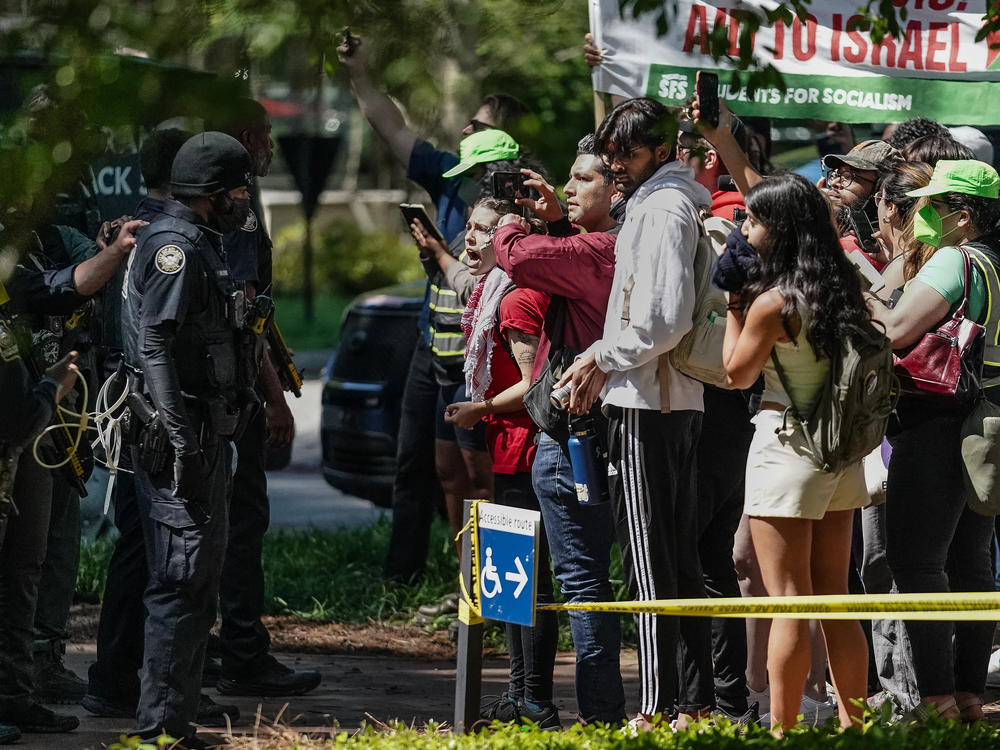Section Branding
Header Content
Columbia and Emory universities change commencement plans after weeks of turmoil
Primary Content
Two universities announced changes to their commencement plans on Monday, after a tumultuous few weeks on campus.
Columbia University is canceling its main ceremony and will focus on multiple school-specific celebrations instead. And Emory University announced it will relocate graduation from its Atlanta campus to a complex in Duluth, Ga., over 20 miles away.
Officials at the New York City institution said in their Monday announcement that based on feedback from students, they will prioritize Class Days and school-level ceremonies, "where students are honored individually alongside their peers," rather than the universitywide ceremony that had been scheduled for May 15.
"Our students emphasized that these smaller-scale, school-based celebrations are most meaningful to them and their families," the announcement from Columbia reads. "They are eager to cross the stage to applause and family pride and hear from their school's invited guest speakers. As a result, we will focus our resources on those school ceremonies and on keeping them safe, respectful, and running smoothly."
As part of that effort, the university is relocating those ceremonies, which were originally scheduled to take place on the South Lawn — where protesters picketed and camped out in tents for two weeks, calling for an end to war in Gaza and university investment in Israel, until police cleared out campus last Wednesday.
Those ceremonies will move to the Baker Athletics Complex, Columbia's main venue for outdoor sports. The events will run from May 10-16, with tickets required. Columbia College will hold its ceremony on the morning of May 14, followed by the affiliated Barnard College the next day.
Columbia President Minouche Shafik had previously requested a New York Police Department presence on campus through at least May 17, "to maintain order and ensure encampments are not reestablished."
She wrote to the NYPD on April 30, as police arrived to remove pro-Palestinian protesters who had occupied a building on campus earlier that day. It was the second time that month that Shafik called in city police to break up protests on campus.
Police broke up the "Gaza Solidarity Encampment" and arrested more than 100 people on April 18, the day after it was first set up. Demonstrators regrouped, forming another encampment that continued to grow even as administrators negotiated with student activists over an agreement that would result in its removal.
On April 29, after negotiations stalled, Columbia began suspending students who did not heed its warning to leave the encampment by 2 p.m. The next day, dozens of students began occupying Hamilton Hall — in an echo of the school's 1968 protests — and barricading themselves inside.
The university — which had already shifted to hybrid learning for the rest of the semester — was essentially under lockdown. Police entered Hamilton Hall, arresting 112 protesters. New York City officials said over the weekend that 29% of them were not affiliated with the school.
Shafik has faced widespread criticism and calls to resign from both sides of the aisle over her handling of the protest, though maintains the backing of Columbia's board of trustees.
Officials acknowledged on Monday that "these past few weeks have been incredibly difficult for our community."
And they said they are continuing to solicit student feedback about the possibility of a "festive event on May 15 to take the place of a large, formal ceremony."
Columbia is the second major university to cancel part of its graduation ceremony. The University of Southern California announced in late April that it would cancel its main graduation ceremony, several days and considerable backlash after it scrapped its valedictorian speech over security concerns.
Other schools are forging ahead with graduation as planned, but expecting — and for some, already experiencing — protests during the day. Over the weekend, students and faculty at Indiana University held an alternate graduation ceremony, while dozens of pro-Palestinian protesters waving flags and banners briefly disrupted the University of Michigan's graduation.
Emory is moving its graduation off-campus
Emory President Gregory Fenves announced on Monday that the school will hold its commencement ceremonies off-campus, citing security concerns.
The change applies to the universitywide ceremony on May 13, as well as the diploma ceremonies for each of its nine schools. Graduation events will begin on May 10, according to a revised calendar.
They will be held at the Gas South District in Duluth, an area that includes an arena and a convention center. It is about 20 miles northeast of Emory's Atlanta campus and 30 miles northwest of its Oxford campus, according to the university.
Fenves acknowledged in a note to the community that the "news will be deeply disappointing to many of you."
"Please know that this decision was not taken lightly," he added. "It was made in close consultation with the Emory Police Department, security advisors, and other agencies — each of which advised against holding Commencement events on our campuses."
He also congratulated the "like no other" Class of 2024, noting the pandemic interrupted may of their high school graduations and forced them to begin college online.
"You will have your moment together, in person, alongside the people who matter to you the most," he added.
The announcement comes after more than a week of student protests against the Israel-Hamas war and the construction of a controversial public safety training center, dubbed "Cop City."
Demonstrations intensified as university, city and state law enforcement officers clashed with and forcibly arrested some two dozen protesters on April 25, including students and faculty members.
Emory's arts and science faculty have since passed a no-confidence vote against Fenves, and undergraduate students are holding a vote of their own Monday into Tuesday.
As campus protests continue, Emory officials are urging graduates to heed security warnings for commencement activities.
Gas South District venues have various requirements for security screening, event safety, and guest conduct, according to its website, including prohibiting backpacks and "signs on sticks or oversized signs (no larger than 8 1/2" x 11")."
An FAQ on Emory's commencement webpage also outlines the school's expression-related protocols for commencement, which it says are "similar to events that are held on campus."


